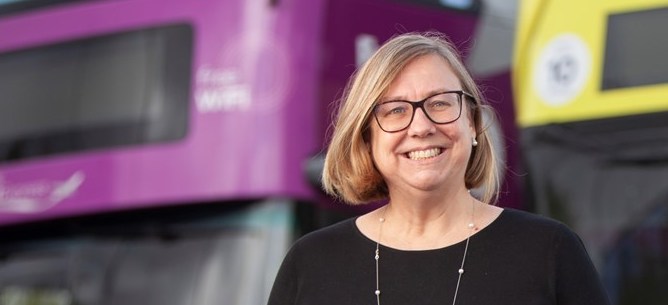In a £3m investment involving 18 zero emission buses all diesel buses at First Bus’s depot in Leicester are being replaced with 86 electric buses funded by the Zero Emission Buses Regional Areas, making Leicester home to one of the first bus depots in the UK to transition to fully electric.
First Bus MD Janette Bell said: “We’re absolutely delighted that Leicester will become one of our blueprint bus depots of the future, helping us to refine and iterate this new concept so we can roll it out across the rest of the UK. At First Bus, we’re continuing to trailblaze with our partners to ensure we meet our net zero targets, supported by co-funding from the Department for Transport.
“As leaders in sustainable mobility, we are fully aligned with the government’s ambitions for a net zero carbon transport system. Through this co-funding with the ZEBRA scheme, we’re excited to electrify another five of our UK depots before March 2024, and look forward to introducing even more electric buses to our constantly growing fleet.
“We cannot wait to see our customers’ reactions once the project is complete, as we know the difference this will make to the city. Electric really is the future and we’re glad we can take our customers on this journey with us.
In total Leicester has benefitted from nearly £22 million funding from the ZEBRA scheme to support 114 electric buses.
Roads Minister Richard Holden said: “Buses are the backbone of our transport network, providing affordable travel for commuters, families, and pensioners, and providing an economic lifeline for towns and cities around the country.
“This multimillion investment for Leicester’s clean transformation, coupled with the new Bus Centre of Excellence, will help drive the country’s bus sector recovery and provide passengers with cleaner, more affordable buses that run on time.”
The Leicester announcement comes in parallel with news of Government plans to invest £815,000 in a new Bus Centre of Excellence designed to bring together expertise from local government, bus operators and industry to boost skills and diversity in the bus sector.
Hosted by the Chartered Institution of Highways and Transportation, it will provide training opportunities, direct access to resources and industry experts, as well as networking events to uplift the capacity and capability of the whole sector, working to encourage people to get back on the bus.



